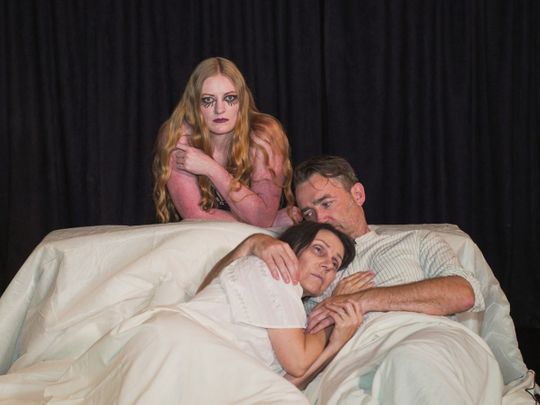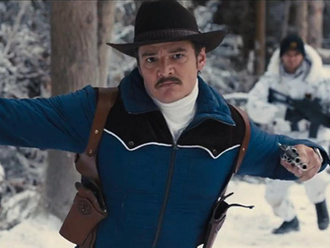
The endless night. The last sleep. The final rest. Death. When the end is near, it brings with it harsh questions, of life, of legacy, of self. It requires not only introspection but often forgiveness and understanding. Steeped in this state of almost gone is playwright Marina Carr’s production ‘Woman and Scarecrow’, which will play out at The Theatre at Mall of the Emirates from June 16-19 at 7.30pm.
In the play, an unnamed woman on her death bed reflects on her life and family. For now, a sort of spiritual guide, the Scarecrow, is warding off death. Director Padraig Downey, of Danú Theatre, says: “I read the play on a flight (a rarity over the past 16 months) and the piece really impacted me, especially the ending. I was "rapt withal." When I have such a connection to a script, I know I have to produce it.
“[Carr] is an extraordinary playwright. Her plays have it all and show the essence of humanity in its purest and rawest form - warts and all. Brutal in many respects full of dark humor but honest. Her work deserves to be seen more.”
The COVID question
We live in a COVID era, where face masks and sanitisers have become essential armour. The news of deaths, disease and hapless victims is always on hand; a creeping anxiety has laid its cold fingers on everyone; the blade of existential angst sharpened in isolation and ready to take a jab at anyone with a lowered guard. But does the play become more poignant because of this or in spite of the questions it evokes? “I think as human beings, we are always questioning, always searching COVID or no COVID. Artists aren't the only ones with existential angst. How can we not question? Wonder? Some people are just better at pretending than others (perhaps they are the true actors?),” says Downey.
“COVID made us stop, look and truly look at ourselves and who we really are, warts and all. Do we like what we see? And if not, how can we change things to like ourselves or live our lives better; perhaps even learn to love ourselves as opposed to some warped social media filtered version of ourselves, that, let's be honest, isn't truly us,” he says.
And perhaps it’s a similar state of mindfulness that comes with a looming threat.
Stage alterations
For theatre, the pandemic has meant changes – smaller productions, delayed shows. But one thing’s for certain, while the pace may change, the show will go on. “COVID has made us stall some projects with larger casts and look at using smaller casts for obvious reasons. At Danú, we still went ahead and did Tennessee Williams’ ‘The Glass Menagerie’ in October but had to postpone it by a month as one of the actors was in touch with a confirmed case so had to isolate. It was incredibly difficult to make plans when so many had to isolate. It was also more difficult to get audiences out into the theatres as people were living in fear but now, there is much more hope and ticket sales reflect that,” he explains.
And with hope, the fear can recede a bit. And leave space for thoughts: of peace, of resolution. Carr’s dramatization of a life’s end comes with sensitive glasses, with humour that dulls the discussion’s harsh edges. “This play (Woman and Scarecrow), even though it deals with something we all will have to face actually is humorous in many places and loveable. It is also incredibly honest and doesn't romanticise anything including relationships people have with each other.
“Life isn't perfect and neither is any one of us but I guess, we all have to make peace. And I think that's what stands out - learning to make peace with oneself and accept who we are even if there are things we don't like. There is a release at the end of the play. A beautiful sense of calm,” he says.
The darkness of the night brings thoughts, of self, of life, of legacy. But that doesn’t mean it can’t also bring peace.








